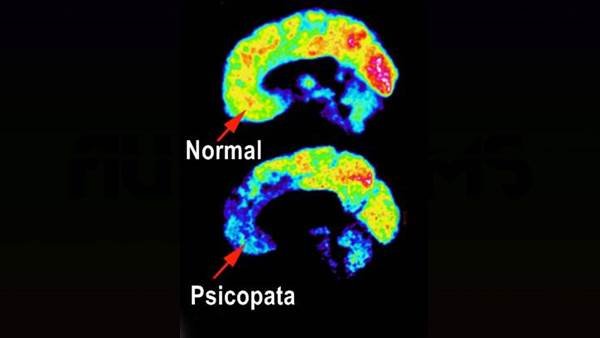I didn’t knew what it was that brings people to be friends. I did not knew what it was that attracts people to one another. I did not knew what was at the basic of social interaction.
I do not feel guilty about anything. I'm sorry for the people who feel guilty
I'm a cold motherfucker to whom always you point your fucking eyes on. I do not care about these people.
- Ted Bundy
These creepy quotes by Ted Bundy picturesquely represent basic characteristics of psychopaths: an insensitive person who uses others with blank emotions, impulsive procedures and inability to feel guilty or regret. Perhaps the lack of empathy is the main characteristic of the psychopath. Empathy implies ability to understand what other person is going thru. Essentially, that puts her thru other person position and living their emotions. Empathy allows us to understand other people and very offten is forcing us to take measures so we could ease suffering of another person. When we feel empathy for someone, it's bigger possibility we will try to help them. In that meaning, the purpose of empathy is to reset selfish and indifferent tendencies in people. Psychopaths do not have the capacity to understand that someone is suffering, fot them that feeling is unknown, foreign and that’s why they are disposed to do all kind of bed things (murders, robberies, rape, etc.).
The causes of psychopathy are still a mystery. We even don’t have adequate answer to question is psychopathy cause of mother nature or is it a product of home raise. The researches show us that psychopathy is 60% hereditary. If psychopathy is hereditary, than we should expect some abnormality in brain. Some researches point that psychopathy is connected with reduce communication between subcutaneous brain structure which treats negative nerves - and ventromedial prefrontal cortex (vmPFC) frontal part of brain which interprets the signals of amigdale. When the communication between those two parts is weak, the negative stimulans processed in the amygdala do not translate into any powerful negative emotions. This fits into the image we have about psychopaths. They don’t feel nervous or shame when they are caught doing something bad. Also, they don’t feel empathy with other persons when they see them suffering.
Neuroscientist Jim Fallon, who is investigating the minds of serial killers for several decades came up with some discoveries. He found that the orbital cortex of psychopaths and sociopaths is completely inactive. This discovery makes sense if we have in mind the fact that orbital cortex is connected with moral behavior, ethics and control of the impulse.What Fallon discovered during his research is very startling, look:
Then I made a PET scan of my brain and noticed something quite disturbing about what I did'n want to say.
What he did'n want to discover is that his orbital cortex seems inactive. Fortunately, Fallon had a great childhood, so there is nothing to worry about.
However, the inheritance is not enough to explain the cause of psychopathy. Do parents influence of the creation of a psychopath? Scientists believe that beside genetics and brain structure we need one more thing that makes someone psychopath, and that is abuse in childhood and negligence by parents. Usually they get confusing messages from their parents- they beat them, and then they say they love them. Also, their parents teach them less about social and moral norms. Of Course, we should not blame parents for everything, but there are persons that had terribly education from their parents and they didn't become sociopaths. Although, some serial killers like Charles Manson are abused and neglected as children, there is a long list of serial killers with normal childhood. Famos serial killers such as Ted Bundy, Jeffrey Dahmer and Dennis Rader grow up in healthy household with a support of their family.
Contrary to a widespread opinion, there is not any connection between intelligence and psychopathy. Psychopaths do not have above-average intelligence. They look like genius to us because they have the ability to mask, they seem like exemplary citizens and family people, and under that mask there is one ruthless and cold person.
In the end, it can be said that heritage and upbringing play an important role in the development of psychopaths.
So, dear my friends, smile to someone, cry, hug someone. Get shy. Watch the passers-by and consider what kind of life they lead. Show that you are empathic.
Thank you for reading, I hope you liked it!
References:
- Yang,Y. and Raine, R. (2009).Prefrontal Structural and Functional Brain Imaging findings in Antisocial, Violent, and Psychopathic Individuals: A Meta-Analysis. Psychiatry Researh, 174(2), 81-88. doi:10.1016/j.pscychresns.2009.03.012
- Blair, R. (1994).A cognitive developmental approach to morality:investigating the psychopath. Cognitive Development,1-9.




Odlična analiza.
Zahvaljujemo 😊
60% hereditary huh? Interesting. I would have thought it to be the opposite - 60% environmental. Attachment trauma can impact the development of the brain in early childhood, however, which may contribute to the frontal lobe issue.
I know early childhood neglect, in many ways, is far more damaging than any other types of abuse. Although I would strongly disapprove if this happened, I wonder how easy it would be to purposely raise a child to be a psychopath. I also wonder if there are certain cultures that breed more psychopathology than other cultures. Food for thought.
Hello! It is important to note that inheritance and childhood abuse are both needed in order to report psychopathy. If the third knee had a tendency toward psychopathy, it can happen to a person if she/he is abused and neglected in childhood. According to data provided by the FBI, 86% of serial killers are from America.Why is America the "cradle" of such monstrous crimes? Here's what David Scieme says:
" We collect their photos, dirty clothes, a nail snake ... We follow the trials, we listen to the victims on the news. We spend hours and hours watching movies and programs that talk about their life and work, we read hundreds of best-selling books about them, although we know the outcome even before we open them. We do this because we resist the idea that these figures, so familiar and so common in America, were similar to us at all. "